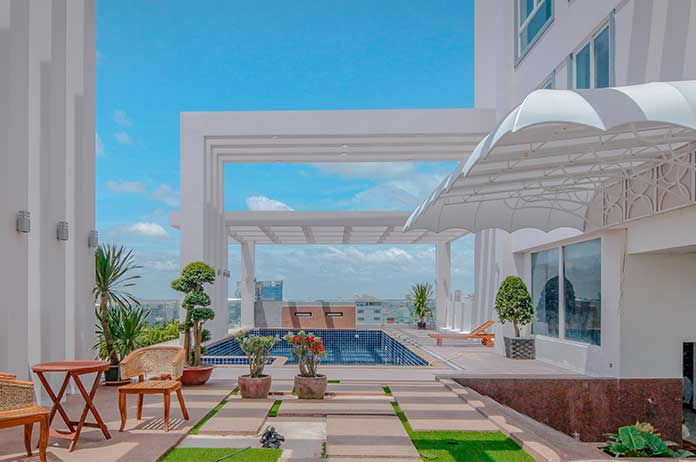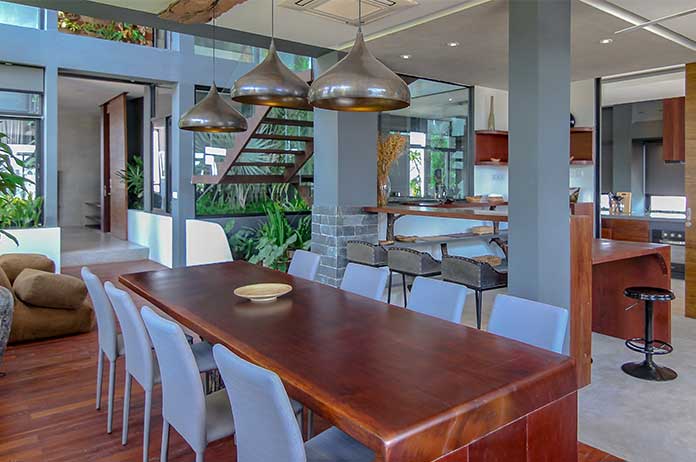Foreign Property Ownership in Cambodia – which is best for you?

For a relatively small city, Phnom Penh offers a broad selection of real estate options for foreigners looking to get into the market. From brand new condominiums with a rooftop pool to French colonial-style villas in need of some TLC, there is something for everyone if they know where to look and of course, the best method to legally secure the property. Let’s kick off by taking a look at the main holding structures available to foreigners: You can also read the latest update in our comprehensive look at the Cambodian real estate market.
Land Holding Company (LHC)
The first option for foreign property ownership is the creation of a Land Holding Company (LHC). A LHC is set up in such a manner where the minority shareholder (the foreigner, holding 49% of the company) has all the decision-making and voting rights within the company, and the majority shareholder (a Khmer national, holding 51% of the company) has extremely limited rights and power.
The majority shareholder needs to be a Cambodian national and is usually provided by the law firm as part of an ongoing annual fee. There are extensive security documents which strip all the power from the majority shareholder and give it to the minority shareholder (the foreigner), which makes it the most secure form of foreign ownership.
Setting up a LHC costs between $4,000 to $12,000 depending on which lawyer you use.
Another item to be taken into account with this structure is the tax obligations. Not only do you have to submit monthly/quarterly tax statements, but you will also be hit with a 20% company profit tax when you sell any asset held by the company.
Given the high setup cost and associated ongoing costs, IPS only recommends this structure to clients looking to make a significant investment in excess of USD$1,000,000.
Nominee Structure
The majority of properties purchased by foreigners in Cambodia use what’s known as a “nominee structure”. At IPS Cambodia, approximately 90% of all our foreign clients choose this structure as it’s cheap, secure, and fast, especially when compared to alternative options such as a LHC.
Often, we have clients who have a Khmer partner or colleague who they put forward as a nominee. However, if they don’t, there are a range of options available to source a nominee for the property for the duration of your ownership.
Having a nominee hold a property in their name on behalf of a foreigner definitely carries some risk, which is why IPS highly recommend using “nominee security agreements” in order to mitigate the risk of having your property held in a third party’s name.
These security agreements are directly between the foreign buyer and the nominee, and as a general rule, there are 4 types of security agreements available:
- Mortgage Agreement
- Loan Agreement
- Lease Agreement
- Security Agreement
The mortgage agreement is registered at the applicable government office and prevents any title transfer without your permission. Once these documents are in place, the nominee can’t sell, transfer, move, or do anything with the title without your expressed permission.
When set up properly, this structure is a very strong and inexpensive form of property security for foreign owners.
Another benefit of using a nominee structure is that there are no requirements for monthly/quarterly tax statements and, more importantly, this structure does not attract any profit taxes.
Once you have defined your property requirements and decided on your preferred foreign ownership structure, it’s time to look at some properties. Let’s go over the 3 most common property types: apartments, condos, and landed property.
Get to know the useful terminology for buying properties in Cambodia.
Apartments

Whether it be for living or flipping, a favourite among Western/European expats has always been the renovated apartment.
The Indochina dream of owning an airy, French Colonial apartment with original tiles and wooden shutters is still alive and well, although it does come with its challenges. These apartments can be picked up for as little as $35,000 for an unrenovated 1-bedroom apartment, right up to $500,000 for a 3-bedroom penthouse overlooking the river.
If you are looking to renovate yourself, there are boxes you need to tick before starting the project:
Construction permit: This used to be a formality; however, government officials are now a little more discerning with approving construction permits for renovation projects. You will also need to get written approval from neighbors, as they can bring your project to an abrupt halt with a single complaint to the Village Chief.
If you are planning to renovate a property, I recommend making initial inquiries about construction permits and talking to neighbors before making a purchase so there are no nasty surprises following the purchase.
The entrance to the apartment is another important point to consider. An ideal entrance is a gated doorway, straight off the street, which leads to a well-lit (natural light or installed lights) staircase that’s clean and well maintained.
I have been to many beautiful apartments that would be great to live in if you didn’t have to walk down a dark alleyway peppered with litter and the odd rat, which led to a darker, rundown stairwell. The entrance has often been a deal breaker for potential buyers and renters.
The good news is that most entrances can be greatly improved by simply giving the stairwells a coat of paint, installing some sensor lights, and keeping common areas free of rubbish.
Although there are some hard title apartments out there, the vast majority of renovated/unrenovated apartments in Phnom Penh come with a soft title. Most of these can be converted to hard title (if you are happy to pay the 4% transfer fee), but they don’t qualify for the strata title that condominiums have.
Given this and the relatively low cost for these apartments, IPS recommend using a nominee structure to hold these properties. The cost of this structure is in line with the required investment to purchase an apartment and provides excellent security over the property.
Use the useful property guides at Realestate.com.kh
Condominiums
The past few years have seen an explosion in the number of condominium developments in central and greater Phnom Penh. The catalyst for this boom was the introduction of a new law allowing for foreign ownership of “strata title” property (common ownership of a building), which has seen an influx of foreign investors entering the Cambodian property market.
In Phnom Penh, prices for condominiums range from $1,000/sqm at the low end to $4,500 at the top end of the market, with developments varying greatly in quality and services according to price.
An important item that foreigners need to be aware of is that many “condominiums” at the lower end of the market only come with a soft title, not a proper strata title. The developer will issue soft titles as a cost-cutting measure or because they don’t meet the legal requirements necessary to be issued a Strata title.
Buyers should always check this carefully, as a soft title cannot be held in a foreigner's name.
Given the number of condominium projects under development, there has been a lot of talk about oversupply issues in the market. This definitely has merit, as the sheer number of units coming online this year begs the question of “who is going to live in them?”
So is there any value still in this market? Absolutely, you just need to do your research.
It’s a cliché, but one of the keys to maximizing your condominium investment is the location of the development – the old adage of “location, location, location” definitely holds true.
The first choice of Western and Asian expats looking to rent and with a budget sufficient to afford the rent in a new condominium is undoubtedly BKK1. BKK1 is very centrally located, has a plethora of restaurants, bars, and retail stores, and is one of the more picturesque parts of the city.
In simple terms, owning a condominium in BKK1 will give you the best chance of realizing your rental yield. You will pay a premium for a condominium in this suburb, but it’s well worth the money.
As mentioned previously, foreigners can own Strata Title condominiums in their own name, so there is no need for any specialized holding structure. This makes owning a condo in Cambodia a very simple and straightforward process.
Landed Property – Villas, Townhouses and Land
Landed property is the most expensive property type in Phnom Penh, especially if you are looking at the city centre (Daun Penh down to Russian Market) with transacted prices currently sitting around $2,500 – $5,500/sqm.
However, it’s also the most flexible in terms of what you can use it for, often used for villas/townhouses varying from family living, office space, shopfronts down to complete demolition for development purposes if the land size is sufficient.
Residential villas and townhouses here are plentiful, especially in the outer areas of the city with the huge number of boreys (gated communities) under development.
A lot of these brand new villas and townhouses can be picked up for a reasonable price, but I can honestly say that from a Western perspective, most leave a lot to be desired in terms of quality and design.
The biggest upside to landed property is the capital growth potential. Phnom Penh has seen huge amounts of capital growth over the past 10 years and there are still great returns available if you know where to look.
As an example, if you bought a landed property in Sen Sok in 2010 and held it until now, you would have done very very well for yourself. It wouldn’t be unreasonable to say that land prices quadrupled during that time.
There is still excellent value in areas such as Chbar Ampov, which has become a growth corridor for the city. Bargains can be found in areas off the main road, and prices will only increase as access (more roads are planned) and facilities improve in the coming years.
As for the recommended holding structure for landed property, it really comes down to your budget. A general rule of thumb I have is, if your investment is more than $1M, then it’s worth looking at setting up a land holding company. If not, use the Nominee Structure as it’s much more cost-effective given the investment amount.
Purchasing property here is no different from buying in any real estate market in the world, you need to do your research and clearly identify your personal reasons for buying.
There is a lot of choice in the current market, and it’s just a matter of finding the one that fits your buying profile. Remember to always do your research into foreign ownership structures before viewing properties, you need to be comfortable with the available structures or you might end up chasing an unattainable dream house.